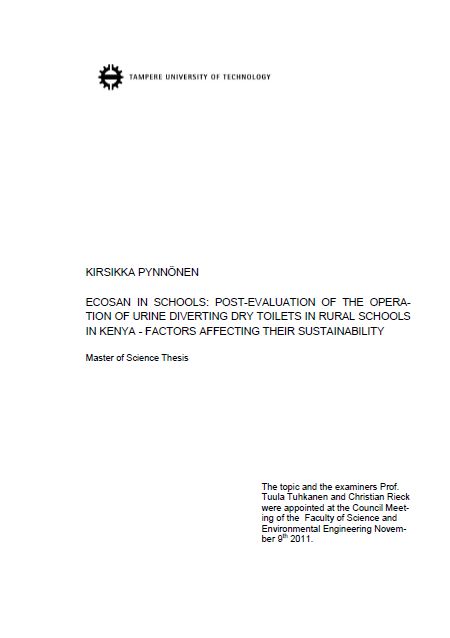Ecosan in schools: post-evaluation of the operation of urine diverting dry toilets in rural schools in Kenya - Factors affecting their sustainability
Pynnönen, K. (2012)

Published in: 2012
Author:
Pynnönen, K.
Uploaded by:
SuSanA secretariat
Partner profile:
common upload
6849 Views
162 Downloads
Location of library entry
Content - Summary
The Ecosan Promotion Project (EPP) in Kenya, funded by EU, GTZ and Sida, was promoting appropriate ecological sanitation (ecosan) technologies during the project period (2006-2010). Urine Diversion Dry Toilets (UDDTs) were built in 73 primary and secondary schools throughout Kenya with four units in each school.
The purpose of the research in question was to monitor and post-evaluate UDDTs implemented by the EPP, two years after the constructions. In November 2011 and January 2012 five schools were visited and evaluated in southern Nyanza province and five in Western province in Kenya. The schools were pre-evaluated and selected for this research on the basis of their good performance in operation and maintenance (O&M) of their UDDTs.
The constructions of the UDDTs were financed by EPP but maintenance is organized and funded by the schools themselves. Generally a common problem for sanitation projects is poor long term maintenance of the facilities, after the donor funding for construction and initial training has ended.
Monitoring and post-evaluation of the UDDTs focused on how the facilities are being managed and used. Methods for this were on-site observations, interviews and discussions together with teachers, pupils and caretakers. The research objective was to determine the reasons for the good practice, but also to identify the problems and reflect the results to improve O&M systems in the future. One major problem observed was gradual or sudden disappearance of the initial motivation and knowledge from the school, often when the person in charge of sanitation left the school.
According to the results of this research, an important factor motivating the schools to keep their UDDT facilities clean and in good condition, were the actual bene-fits received from the sanitation systems such as clean and comfortable toilet facilities, healthier environment, e.g. very low risk for ground water pollution and spreading of pathogens into the surroundings, saved space on the school yard as UDDTs can last long at the same spot, and possibility to use the UDDT products either as fertilizers or soil conditioner. These benefits and good results lead to motivation and deeper engagement and to continuity. Especially utilization of UDDT products indicates that the concept of ecological sanitation and technology of UDDTs have been accepted.
Additional information
reuse, performance, cleaning, O&M
Bibliographic information
Pynnönen, K. (2012). Ecosan in schools: post-evaluation of the operation of urine diverting dry toilets in rural schools in Kenya - Factors affecting their sustainability.
Filter tags
English Schools Sub-Saharan Africa Urine diversion dehydration toilets (UDDTs)















